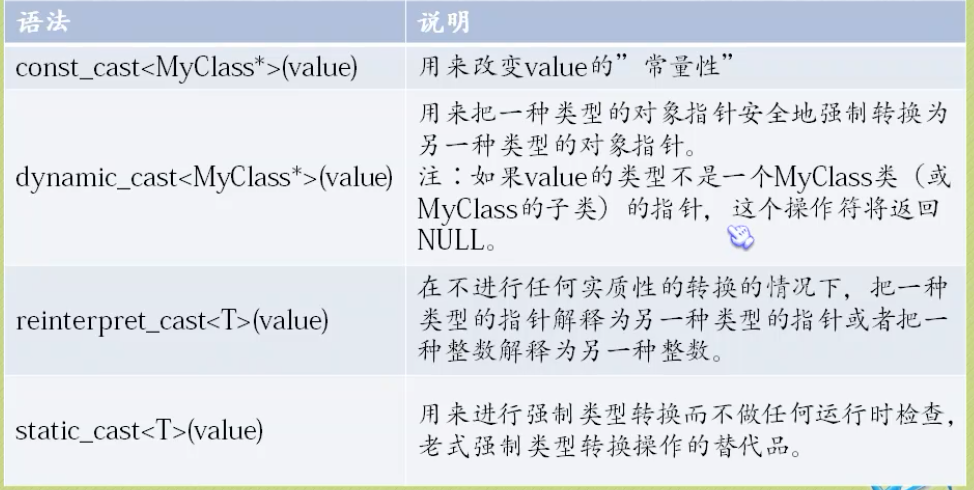大家还记得我们前阵子制造出一个苹果公司么?没错,这节课我们还继续对这家公司入手进行讲解!Example.cpp:
#include<iostream>
#include<string>
class Company
{
public:
Company(std::string theName, std::string product);
virtual void printInfo();//声明为虚函数
protected:
std::string name;
std::string product;
};
class TechCompany : public Company
{
public:
TechCompany(std::string theName, std::string product);
virtual void printInfo();
} ;
Company::Company(std::string theName, std::string product)
{
name = theName;
this->product = product;
}
void Company::printInfo()
{
std::cout<<"这个公司的名字叫:"<<name<<"is producting"<< product <<"
";
}
TechCompany::TechCompany(std::string theName, std::string product):Company(theName, product)
{
}
void TechCompany::printInfo()
{
std::cout<<name<<"公司大量生产了"<<product<<"这款产品!
";
}
int main()
{
Company *company = new TechCompany("APPLE", "Iphone");
TechCompany *techCompany = (TechCompany *)company;//强制类型转换,若无强制转换会报错。
techCompany->printInfo();
delete company;
delete techCompany; //不需要本句,因为company,techCompany指向同一块地址,无需重复释放,会报错
company = NULL;
techCompany = NULL; //本句需要
return 0;
}
要点总结:
我们用传统的强制类型转换实现:把所需要的括针类型放在一对圆括号之间,然后写出将被强制转换的地址值。
Company *company = new Company("APPLE","Iphone");
TechCompany *tecCompany = company;
注意不能既删除company,又删除tecCompany。
因为强制类型转换操作不会创建一个副本拷贝,它只是告诉编译器把有关变量解释为另一种类型组合形式,所以他们指向的是同一个地址。现在术语称之为“重婚”!只需要释放一个就行。
动态对象强制类型转换
虽然刚刚那个栗子程序看起来很美!但它仍有一个问题没有解决:万一被强制转换的类型和目标类型结构完全不同,咋整?
编译器很笨的,它仍然将按照我们的代码行事!这样子的程序是相当危险的,随时可能前绩以及被前绩。
因为在类继承关系之间跳来转去(也就是对有关对象进行强制类型转换)在面向对象的程序里非常重要,所以C++程序员准备了几个新的强制类型转换操作符(高级)!注意:第二个最为常用。
注:只要你喜欢,你仍可以在C++里继续用C的强制
转换操作符(像刚才的栗子),但表中的操作符还能进行必要的类型检查,因而能够改善程序的可靠性。动态强制类型转换的语法与刚刚我们学到的有很大不同,它看起来更像是一个函数调用:
Company *company = new Company("APPLE", "Iphone");
TechCompany *tecCompany = dynamic_cast< TechCompany*>(company);
先在两个尖括号之间写出想要的指针类型,然后是接被转换的值写在括号中。
那我们一起来动手改改刚才的栗子吧,让它看上去更美丽一些:
#include<iostream>
#include<string>
class Company
{
public:
Company(std::string theName, std::string product);
virtual void printInfo();//声明为虚函数
protected:
std::string name;
std::string product;
};
class TechCompany : public Company
{
public:
TechCompany(std::string theName, std::string product);
virtual void printInfo();
} ;
Company::Company(std::string theName, std::string product)
{
name = theName;
this->product = product;
}
void Company::printInfo()
{
std::cout<<"这个公司的名字叫:"<<name<<"is producting"<< product <<"
";
}
TechCompany::TechCompany(std::string theName, std::string product):Company(theName, product)
{
}
void TechCompany::printInfo()
{
std::cout<<name<<"公司大量生产了"<<product<<"这款产品!
";
}
int main()
{
Company *company = new TechCompany("APPLE", "Iphone");
TechCompany *techCompany = dynamic_cast<TechCompany *>(company);//强制类型转换,若无强制转换会报错。
techCompany->printInfo();
delete company;
company = NULL;
techCompany = NULL; //本句需要
return 0;
}
注意第二个转换操作符:如果value的类型不是一个MyClass类(或MyClass的子类)的指针,这个操作符将返回NULL。一定运行看看哈!
#include<iostream>
#include<string>
class Company
{
public:
Company(std::string theName, std::string product);
virtual void printInfo();//声明为虚函数
protected:
std::string name;
std::string product;
};
class TechCompany : public Company
{
public:
TechCompany(std::string theName, std::string product);
virtual void printInfo();
} ;
Company::Company(std::string theName, std::string product)
{
name = theName;
this->product = product;
}
void Company::printInfo()
{
std::cout<<"这个公司的名字叫:"<<name<<"is producting"<< product <<"
";
}
TechCompany::TechCompany(std::string theName, std::string product):Company(theName, product)
{
}
void TechCompany::printInfo()
{
std::cout<<name<<"公司大量生产了"<<product<<"这款产品!
";
}
int main()
{
Company *company = new Company("APPLE", "Iphone");
TechCompany *techCompany = dynamic_cast<TechCompany *>(company);//强制类型转换,若无强制转换会报错。
if(techCompany != NULL)
{
std::cout<<"成功!
";
}
else
{
std::cout<<"悲催!
";
}
techCompany->printInfo(); //本句错误,因为techCompany现在指向的是NULL指针
delete company;
company = NULL;
techCompany = NULL;
return 0;
}